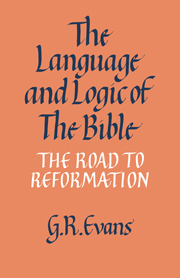Book contents
- Frontmatter
- Contents
- List of abbreviations
- List of sources
- Biographical notes
- Introduction
- I Scripture's divine warrant
- 1 ‘Scripture hath for its author God himself’
- 2 The human authors of Scripture
- 3 Handing on and explanations
- 4 Sola scriptura
- 5 Towards private judgement: ‘The children of God spy out their father’
- II The rules of interpretation
- III Practical interpretation
- Conclusion
- Notes
- Select bibliography
- Index
3 - Handing on and explanations
from I - Scripture's divine warrant
Published online by Cambridge University Press: 12 October 2009
- Frontmatter
- Contents
- List of abbreviations
- List of sources
- Biographical notes
- Introduction
- I Scripture's divine warrant
- 1 ‘Scripture hath for its author God himself’
- 2 The human authors of Scripture
- 3 Handing on and explanations
- 4 Sola scriptura
- 5 Towards private judgement: ‘The children of God spy out their father’
- II The rules of interpretation
- III Practical interpretation
- Conclusion
- Notes
- Select bibliography
- Index
Summary
The Fathers
In the late sixteenth century William Fulke gives a picture of the protestant position on the Fathers which, with a nice irony, both puts them in their secondary place and, at the same time, defers to their judgement. There is, he says, no intention on the part of the reformers ‘to discredit the … expositions of the Fathers’; the plan is ‘to fetch the truth, upon which the hope of our salvation is grounded, out of the first fountains and springs’, the Hebrew text of the Old Testament and the Greek text of the new, ‘rather than out of any streams that are derived from them’. ‘And this we do,’ he adds, ‘agreeable to the ancient Fathers' judgements.’ The Fathers are not the ‘first fountains and springs’. But they have authority, as ‘derived’ from the sources.This idea that the Fathers derive an authority from a source behind them, and that their authority flows in a stream onward to others after them, is a standard picture. The Counter-Reformation polemicist Thomas Stapleton also finds it helpful in the sixteenth century; he employs the image in his Praefatio ad Lectorem in his Promptuarium on the Sunday Gospels (Antwerp, 1593).
Marsilius of Padua sets out to show in the early fourteenth century what power and authority Christ wanted to grant to the apostles and their successors. He argues a point ‘in accordance with the mind of the Master of the Sentences’ Peter Lombard, ‘or rather of the Scripture and of the saints by whose authority he speaks’; and also in accordance with the opinion of Richard of St Victor. ‘From these authorities of the saints, the Master and Richard, it is thus clear …’
- Type
- Chapter
- Information
- The Language and Logic of the BibleThe Road to Reformation, pp. 20 - 30Publisher: Cambridge University PressPrint publication year: 1985



